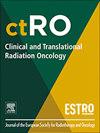Neoadjuvant chemoradiotherapy up-regulates PD-L1 in radioresistant colorectal cancer
IF 2.7
3区 医学
Q3 ONCOLOGY
引用次数: 0
Abstract
Background
Combining radiotherapy (RT) with immune checkpoint inhibitors (ICIs) is a promising strategy that can enhance the therapeutic efficacy of ICIs. However, little is known about RT-induced changes in the expression of immune checkpoints, such as PD-L1, and their clinical implications in colorectal cancer (CRC). This study aimed to investigate the association between responsiveness to RT and changes in PD-L1 expression in human CRC tissue and cell lines.
Methods
Tissue specimens from preoperative biopsy via sigmoidoscopy and surgical resection were obtained from 24 patients with locally advanced rectal cancer (LARC) who underwent neoadjuvant chemoradiation therapy (CRT) between August 2016 and December 2017. Immunohistochemistry for PD-L1 in formalin-fixed paraffin-embedded tissue was performed from the endoscopic biopsy and surgical specimens. RNA sequencing was performed using 11 pairs of human LARC tissues before and after irradiation. After exposing human CRC cells to radiation, we investigated changes in the expression levels of PD-L1 and its regulatory signaling pathways.
Results
Patients were classified by tumor regression grade into responders (grade 2; 9 patients, 37.5 %) and non-responders (grades 3, 4, or 5; 15 patients, 62.5 %). In the non-responder group, 13 patients had low PD-L1 expression, but neoadjuvant CRT increased PD-L1 expression in 7 patients (53.9 %) (McNemar’s test, p=0.034). CRT up-regulated PD-L1 in non-responder LARC tissues. Similarly, radiation increased PD-L1 in radioresistant DLD-1 cells more than in radiosensitive HCT116 cells, also affecting PD-L1-regulating genes and immune checkpoints in CRC cells. Conventional fractionated radiation treatment further increased PD-L1 in DLD-1 cells compared to HCT116 cells.
Conclusions
This study demonstrated that radiation induces an increase in PD-L1 expression, which is more pronounced in radioresistant CRC, proving the theoretical framework for a combined treatment strategy with a PD-L1 blockade for locally advanced rectal cancer.
新辅助放化疗上调放射耐药结直肠癌患者的PD-L1水平。
背景:放射治疗(RT)联合免疫检查点抑制剂(ICIs)是一种很有前途的策略,可以提高ICIs的治疗效果。然而,关于rt诱导的免疫检查点(如PD-L1)表达的变化及其在结直肠癌(CRC)中的临床意义,我们知之甚少。本研究旨在探讨人类结直肠癌组织和细胞系中对RT的反应性与PD-L1表达变化之间的关系。方法:选取2016年8月至2017年12月24例接受新辅助放化疗(CRT)的局部晚期直肠癌(LARC)患者进行乙状结肠镜术前活检和手术切除的组织标本。对内镜活检和手术标本进行福尔马林固定石蜡包埋组织中PD-L1的免疫组织化学检测。对辐照前后11对人LARC组织进行RNA测序。将人类结直肠癌细胞暴露于辐射后,我们研究了PD-L1表达水平及其调控信号通路的变化。结果:根据肿瘤消退程度将患者分为缓解者(2级;9名患者,37.5%)和无反应(3、4或5级;15例(62.5%)。在无反应组中,13例患者PD-L1表达较低,但新辅助CRT增加了7例患者PD-L1表达(53.9%)(McNemar检验,p=0.034)。CRT上调无应答LARC组织中的PD-L1。同样,放射耐药DLD-1细胞中的PD-L1比放射敏感的HCT116细胞中的PD-L1增加,也影响CRC细胞中的PD-L1调节基因和免疫检查点。与HCT116细胞相比,常规分次放射治疗进一步增加了DLD-1细胞中的PD-L1。结论:本研究表明,放射诱导PD-L1表达增加,在放射耐药的结直肠癌中更为明显,为局部晚期直肠癌联合PD-L1阻断治疗策略提供了理论框架。
本文章由计算机程序翻译,如有差异,请以英文原文为准。
求助全文
约1分钟内获得全文
求助全文
来源期刊

Clinical and Translational Radiation Oncology
Medicine-Radiology, Nuclear Medicine and Imaging
CiteScore
5.30
自引率
3.20%
发文量
114
审稿时长
40 days
 求助内容:
求助内容: 应助结果提醒方式:
应助结果提醒方式:


